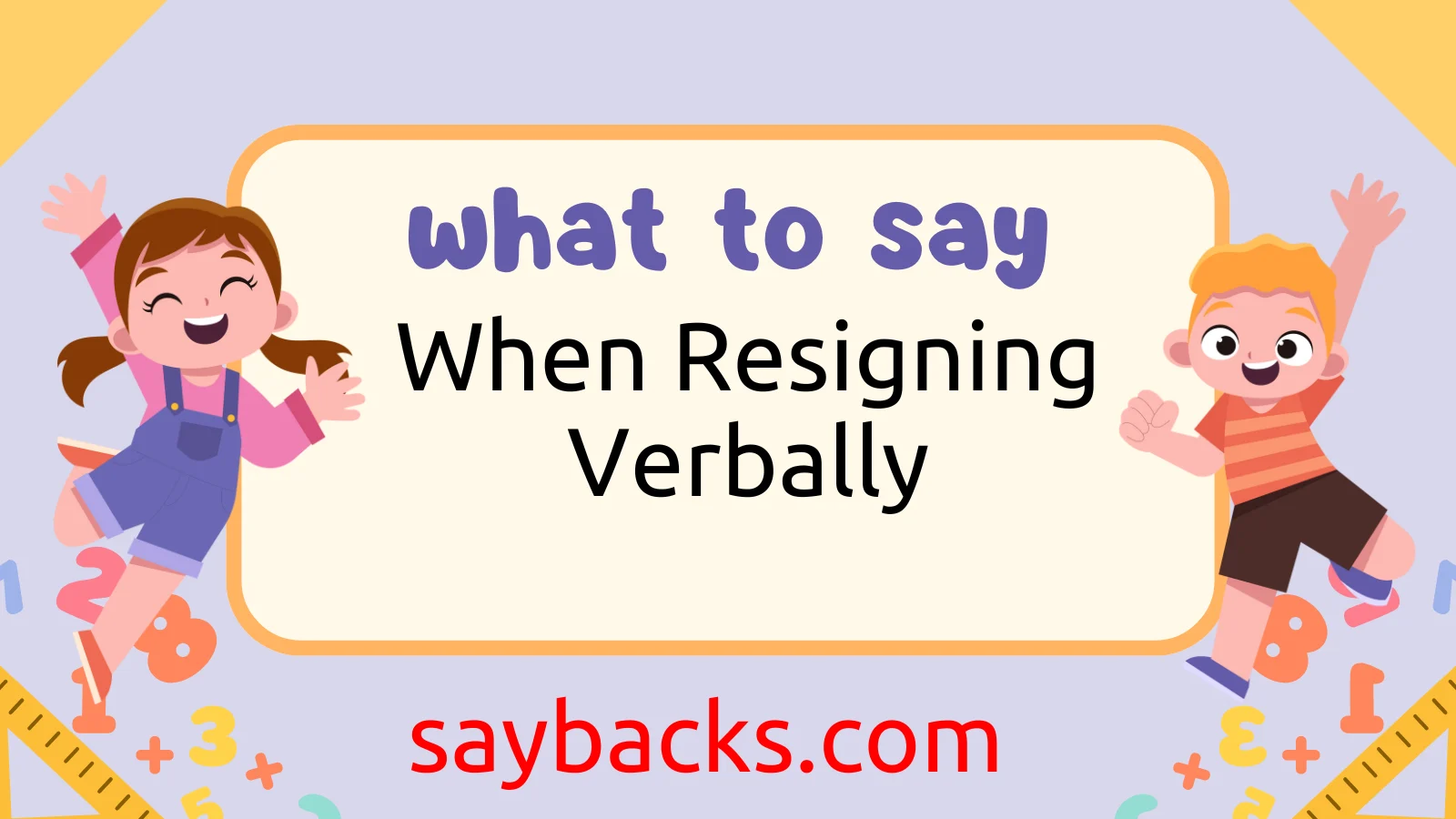Resigning from a job can be a challenging and emotional experience, especially when you’re doing it verbally. Whether you’re leaving for personal growth, a new opportunity, or simply to pursue a different path, it’s essential to handle the conversation with professionalism and respect.
If you’re wondering what to say when resigning verbally, this post will guide you through the process. We’ll provide examples of how to gracefully resign while maintaining positive relationships with your employer and colleagues.
1. Keep It Simple and Direct
Be clear and concise
When resigning verbally, it’s important to get to the point without unnecessary details. Keeping the conversation professional and clear will ensure that both you and your employer understand your decision.
Examples:
- “I’d like to formally resign from my position, effective [last working day].”
- “I’ve made the decision to move on from my role here, and I’d like to submit my resignation today.”
- “After careful consideration, I’ve decided to resign. My last day will be [date].”
Why it works:
By keeping your resignation short and direct, you make the conversation clear and easy to understand. This shows maturity and professionalism in your decision.
2. Express Gratitude for the Opportunity
Show appreciation for your time with the company
Even if you’re resigning for personal reasons or a better opportunity, it’s important to thank your employer for the opportunity and experiences you gained. This can leave a positive impression, which is crucial for future references.
Examples:
- “I want to thank you for the opportunity to work here. I’ve learned a lot and truly appreciate the time I’ve spent with the team.”
- “I’ve enjoyed working here and am grateful for the support and experience I’ve gained during my time at [company name].”
- “It’s been a pleasure working with you and the team. I’ve learned a great deal and appreciate all the opportunities I’ve had here.”
Why it works:
Expressing gratitude helps maintain a positive relationship with your employer, which can be valuable for your professional reputation and future references.
3. Offer to Help with the Transition
Demonstrate professionalism by assisting with the transition
Offering to help with the transition shows that you’re committed to leaving on good terms and that you care about the company’s continued success after you leave.
Examples:
- “I’m happy to help with training my replacement or assist in any way to ensure a smooth transition.”
- “If there’s anything I can do during my notice period to make the transition easier, I’m more than willing to help.”
- “Please let me know how I can assist in making this transition as seamless as possible.”
Why it works:
This shows that you’re being considerate of the company’s needs, even as you move on to new opportunities. It reflects well on you and enhances your professional image.
4. Provide Notice According to Company Policy
Adhere to the appropriate notice period
When resigning verbally, it’s important to follow your company’s resignation policy, whether that’s giving two weeks’ notice, a month, or another time frame.
Examples:
- “As per the company policy, I’ll be happy to continue working for the next [two weeks/month].”
- “I’ll ensure that all my responsibilities are taken care of and will give my best during my notice period.”
- “I’m happy to provide the required two weeks’ notice and ensure a smooth handover of my duties.”
Why it works:
By respecting the company’s notice period, you demonstrate professionalism and respect for the organization’s needs during the transition. This leaves a lasting positive impression.
5. Keep the Conversation Positive and Professional
Avoid venting or speaking negatively
Even if you’re resigning due to dissatisfaction or other negative reasons, it’s best to keep the conversation positive and respectful. Avoid speaking badly about the company, your colleagues, or your role.
Examples:
- “While I’m excited about my next step, I’m grateful for the experiences and growth I’ve had here.”
- “I’ve enjoyed working with this team, and I’m looking forward to my next chapter.”
- “Thank you for the opportunity. I’m excited for what’s next, but I’ll miss the people I’ve worked with here.”
Why it works:
Staying positive keeps the conversation civil and ensures you leave on good terms, which is crucial for your professional future and networking opportunities.
Final Thoughts: How to Resign Professionally and Graciously
Knowing what to say when resigning verbally is key to ensuring that you leave on good terms. By being direct, expressing gratitude, offering to assist with the transition, providing proper notice, and keeping the conversation professional, you can resign with grace and respect.
Remember that your verbal resignation is an opportunity to maintain a positive relationship with your employer and colleagues, which can benefit you in the future. Leave with professionalism, and you’ll carry that reputation with you into your next opportunity.

